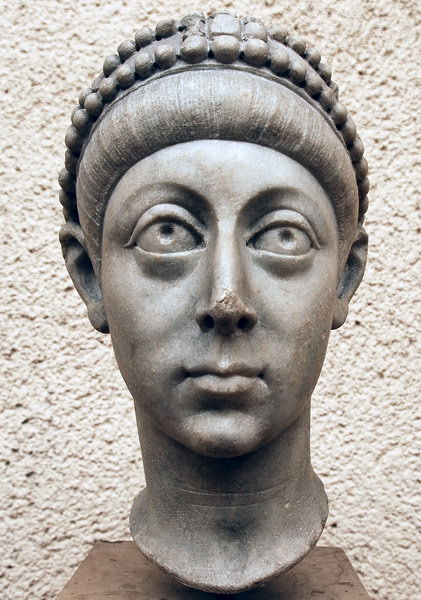Synesius, On Imperial Rule 5
 In his speech On Imperial Rule (or On Monarchy), Synesius of Cyrene offers some advise to the emperor Arcadius (r.395-408). More information about this speech, together with a brief summary, can be found here.
In his speech On Imperial Rule (or On Monarchy), Synesius of Cyrene offers some advise to the emperor Arcadius (r.395-408). More information about this speech, together with a brief summary, can be found here.
Throughout this speech, the word "Scythians" refers to the Tervingian Germans (who would later be known as Visigoths), whereas "king" refers to emperor.
The text is offered here in the translation by A. Fitzgerald. The four-digit numbers are page numbers of the Migne edition.
On Imperial Rule 5
[1] [1065] No term has ever yet appeared in any place that grasps the essence of God, but men once baffled in seeking an image of him desire to touch Himnote through the things that proceed from Him. Thus you may call Him anything you like, the Creative Father,note the Beginning, or the Cause. [1068] All these terms are His relations towards what has proceeded from Him. And so in calling him King, you have attempted to grasp His nature from those over whom He rules, but not by direct touch with Him face to face.
[2] Now then I come to the point when I must mention also, as I promised you, the remaining one of His names. I have kept it back until this opportune moment. What is this thing bound up with and belonging to the king here below, which I said confirmed him and showed him lawfully established, and not falsely named? All men, everywhere, methinks, celebrate the goodness of God, alike peoples that are wise and people that are foolish. In this at least all agree with one another, and speak with the same voice, however they may differ in all other respects in their notions of the Divine element, and however they divide His pure and indivisible nature with a great variety of opinions. But, in sooth, even this undisputed good does not yet disclose to us the throne of God in real existence. That is only gathered from events that follow; for the Good does not come to our hearing as absolute, but as a relative good to those for whom it is an efficacious force and by whom it may be enjoyed. The very thought conveyed in His name is an attempt to signify further that God is the cause of the good. So also the sacred prayers of our fathers in the holy initiations, calling out to the God who is over all, do not glorify His power, but rather bow before His solicitude for us. Of the things that pertain to God, therefore, God is the giver, such as life, being, mind, and indeed anything of a secondary sort, if it be one not unworthy to have come from the first.
[3] It would befit you accordingly not to desert the rank in which you were enrolled nor to shame the identical names, but rather to give yourself up to their imitation, to flood the cities with all things that are good, and to pour all possible happiness on each one of those ruled over. Then only shall we speak the truth in acclaiming you as a great king; not giving you honor by custom merely, not consulting our own advantage, nor seeking to turn away your wrath, but consenting to the very judge in our soul, using our tongue as a sincere interpreter of our thought.
[4] Come then, let me describe for you the king in my discourse as if I had set up a statue of him,note and you shall show me this statue moving and animated with the breath of life. I will take along with me for its fashioning, if it be needed, ideas that have come to the minds of the happy men of bygone days. Do you rejoice not the less in it than others, but the more, as unquestionably befitting a king, as on these things the wise men of the past and the present are agreed.